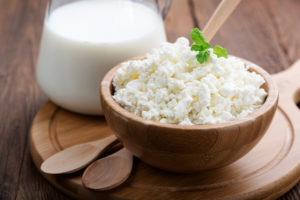Sources of Food Ingredients: Dipotassium Phosphate
Dipotassium Phosphate
- What are phosphates?
Phosphates are a group of inorganic chemicals that are obtained through the neutralization of phosphoric acid which results in the substitution of a hydrogen cation and produces a salt. There are several varieties of phosphate salts, depending on the reaction source, such as potassium hydroxide being used to create a potassium phosphate.
- How is Dipotassium Phosphate made?
Dipotassium Phosphate (DKP) has been used in food production for decades and is made by reacting a source of potassium (usually potassium hydroxide) with phosphoric acid.
- Food-grade phosphoric acid is made from phosphate rocks, which are mined, refined and purified. Companies that make phosphoric acid in the U.S., Europe and elsewhere follow strict procedures to ensure purity.
- The phosphoric acid is reacted with potassium hydroxide and lime water to form a wet mix.
- The resulting reaction creates potassium phosphate, which is then dried and crystalized.
- Finally the product is sized down to specifications.
- Food grade phosphates that are manufactured in the United States comply with the new regulations for food safety as set forth in the Food Safety Modernization Act.
- Why are phosphates in my food?
DKP has many uses in food. It has the ability to act as an emulsifier, protein stabilizer and buffering agent. In addition it can provide a source of Potassium for many foods that otherwise would not have that. Some common uses are as follows:
- Coffee Creamers – DKP can help stabilize the protein layer around fat droplets present in the milk, which helps prevent syneresis and curdling when added to a hot beverage.
- Processed cheese products – DKP help buffer the pH and interact with the milk proteins to promote emulsification.
- Nutrient resource – the potassium present can be used as a mineral supplement for pharmaceuticals and a nutrient base during yeast production and other fermentation processes.
- Soy protein based beverages – DKP can help stabilize soy proteins and act as a dispersing agent.
- Are phosphates permitted for use in the U.S. and in other countries?
DKP is considered GRAS as a sequestrant under 21 CFR 182.6285. In addition DKP has obtained GRAS approval from the FDA for use in food generally, as a multipurpose food ingredient, up to the limits of Good Manufacturing Practice link. DKP is approved in many markets around the world including the EU and Canada EU link Canada link
- Can phosphates be used in foods marketed as organic, vegetarian, halal or kosher?
Vegetarian/Vegan – DKP does not contain any animal or other biological sources so it can be considered suitable for a vegan/vegetarian diet.
Halal – DKP can be Halal certified.
Kosher – DKP can be Kosher certified, and can even include Kosher for Passover.
- How do phosphates benefit my health?
DKP provides potassium which is an important nutrient for the body.
- Why are phosphates necessary in foods and beverages?
DKP is a multi-purpose food additive. Not only does this allow for certain foods to be shelf-stable and appealing but you get the added benefit of potassium. Without DKP many dairy based coffee creamers, cheese products and any other food that is lacking in potassium would not be possible without the use of other, possibly more expensive, ingredients that do not have the additional benefit of potassium.

